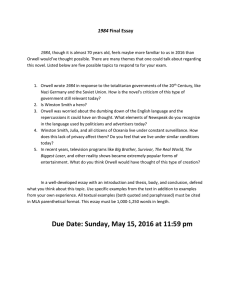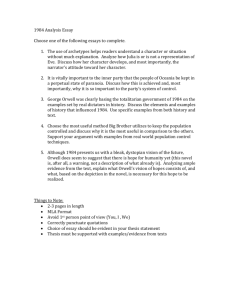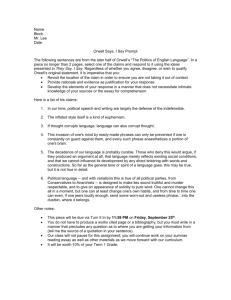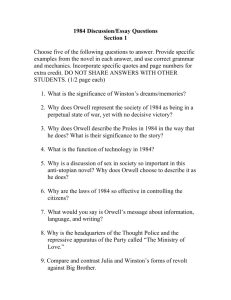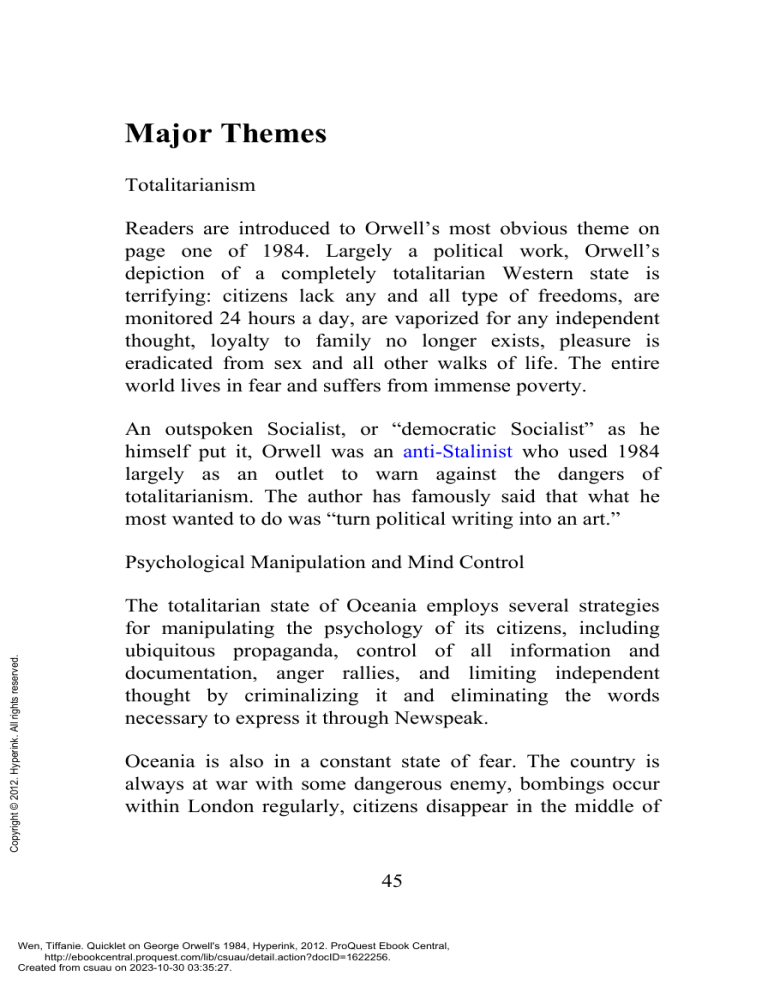
Major Themes Totalitarianism Readers are introduced to Orwell’s most obvious theme on page one of 1984. Largely a political work, Orwell’s depiction of a completely totalitarian Western state is terrifying: citizens lack any and all type of freedoms, are monitored 24 hours a day, are vaporized for any independent thought, loyalty to family no longer exists, pleasure is eradicated from sex and all other walks of life. The entire world lives in fear and suffers from immense poverty. An outspoken Socialist, or “democratic Socialist” as he himself put it, Orwell was an anti-Stalinist who used 1984 largely as an outlet to warn against the dangers of totalitarianism. The author has famously said that what he most wanted to do was “turn political writing into an art.” Copyright © 2012. Hyperink. All rights reserved. Psychological Manipulation and Mind Control The totalitarian state of Oceania employs several strategies for manipulating the psychology of its citizens, including ubiquitous propaganda, control of all information and documentation, anger rallies, and limiting independent thought by criminalizing it and eliminating the words necessary to express it through Newspeak. Oceania is also in a constant state of fear. The country is always at war with some dangerous enemy, bombings occur within London regularly, citizens disappear in the middle of 45 Wen, Tiffanie. Quicklet on George Orwell's 1984, Hyperink, 2012. ProQuest Ebook Central, http://ebookcentral.proquest.com/lib/csuau/detail.action?docID=1622256. Created from csuau on 2023-10-30 03:35:27. the night, and anyone, including your own children, can be a member of the Thought Police and have you killed for thoughtcrime. The Party perpetuates this sense of fear to create a loyalty to Big Brother, who is depicted as the country’s ultimate savior. When an individual fails to remain loyal to the Party through these methods, the Party moves on to direct, physical brainwashing, which is depicted in Part 3, Chapter 2. “At this moment there was a devastating explosion…something had happened inside his head. As his eyes regained their focus he remembered who he was; but somewhere or other there was a large patch of emptiness, as though a piece had been taken out of his brain.” Finally, Orwell argues that if the state is able to control the minds of the people, and also controls all documentation, it therefore controls reality. Copyright © 2012. Hyperink. All rights reserved. The Effect of Language on Thought As mentioned above, the Party limits freedom of expression by eliminating the vocabulary needed to express it. In an Appendix to the novel titled, “Principles of Newspeak,” Orwell describes the mechanisms under which Newspeak provides a “medium of expression for the world view and mental habit proper to the devotees of Ingsoc” and makes “all other modes of thought impossible.” Earlier in the novel, Syme, a Newspeak specialist, explains “‘How could you have a slogan like, ‘Freedom is Slavery’ when the concept of freedom has been abolished? The whole 46 Wen, Tiffanie. Quicklet on George Orwell's 1984, Hyperink, 2012. ProQuest Ebook Central, http://ebookcentral.proquest.com/lib/csuau/detail.action?docID=1622256. Created from csuau on 2023-10-30 03:35:27. climate of thought will be different. In fact there will be no thought, as we understand it now. Orthodoxy means not thinking—not needing to think. Orthodoxy is unconsciousness.’” Copyright © 2012. Hyperink. All rights reserved. The effect of language on thought is a theme Orwell also explored in an essay called, “Politics and the English Language,” in which he purports “the decline of a language must ultimately have political and economic causes.” 47 Wen, Tiffanie. Quicklet on George Orwell's 1984, Hyperink, 2012. ProQuest Ebook Central, http://ebookcentral.proquest.com/lib/csuau/detail.action?docID=1622256. Created from csuau on 2023-10-30 03:35:27.


